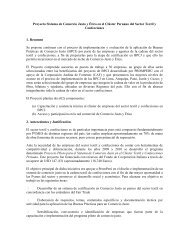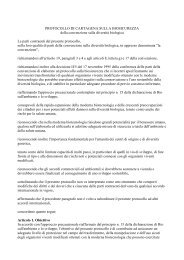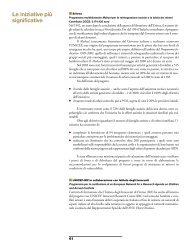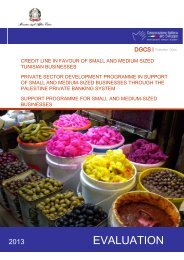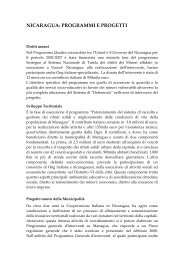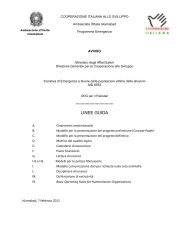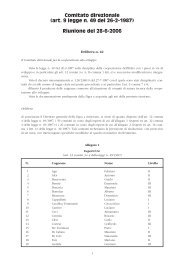FRONTESPIZIO - Cooperazione Italiana allo Sviluppo
FRONTESPIZIO - Cooperazione Italiana allo Sviluppo
FRONTESPIZIO - Cooperazione Italiana allo Sviluppo
You also want an ePaper? Increase the reach of your titles
YUMPU automatically turns print PDFs into web optimized ePapers that Google loves.
4. Building the national health management information system (HMIS) in Ethiopia 414. BUILDING THE NATIONAL HEALTH MANAGEMENTINFORMATION SYSTEM (HMIS) IN ETHIOPIA:TOWARDS EVIDENCE-BASED DECISION MAKINGSandro Accorsi, Nejmudin Kedir1) IntroductionIn the current situation of growing and competing demands for health care,coupled with scarce resources, increasing need for evidence-based decisionmaking has put information high in demand. Setting health priorities involvesdefining and quantifying the health problems, assessing the efficacyand cost of interventions, and translating this information into action. In thiscontext, Health Management Information System (HMIS) is defined as aroutine and systematic collection of data, integrated into information to supportmanagement decision-making.Health Management Information System (HMIS) and Monitoring andEvaluation (M&E) are top in the agenda of the sector and they are one of theseven components in HSDP (Health Sector Development Programme) IIIStrategic Plan. As stated in the HSDP III: “the objectives of M&E are to improvethe management and optimum use of resources of programme and to maketimely decisions to resolve constraints and/or problems of implementation”. Themain concern is to be able to use health status, health service and health expendituredata for planning and evaluation purposes as well as to account forresources in terms of achievements in order to ensure the required public accountabilityfor the health funds.However, this upsurge in demand for information has not been adequatelymet because there has been insufficient investment in building a streamlinedHMIS able to generate timely and reliable data to support decision-makingat all levels.The challenges are to improve the quality of routinely collected data, to developdata analysis, and to find ways of translating the output of the informationsystem into evidence-based decision-making. This is clearly stated inthe HSDP III Strategic Plan: “challenges faced in relation to HMIS are lack ofcoordinated effort and leadership, lack of strategy and policy, shortage of skilledhuman resources and lack of guidelines. The timeliness and completeness ofHMIS reporting remain poor, and such delays contribute to the failure (at all levels)to use data as the basis for informed decision-making in planning and man-





